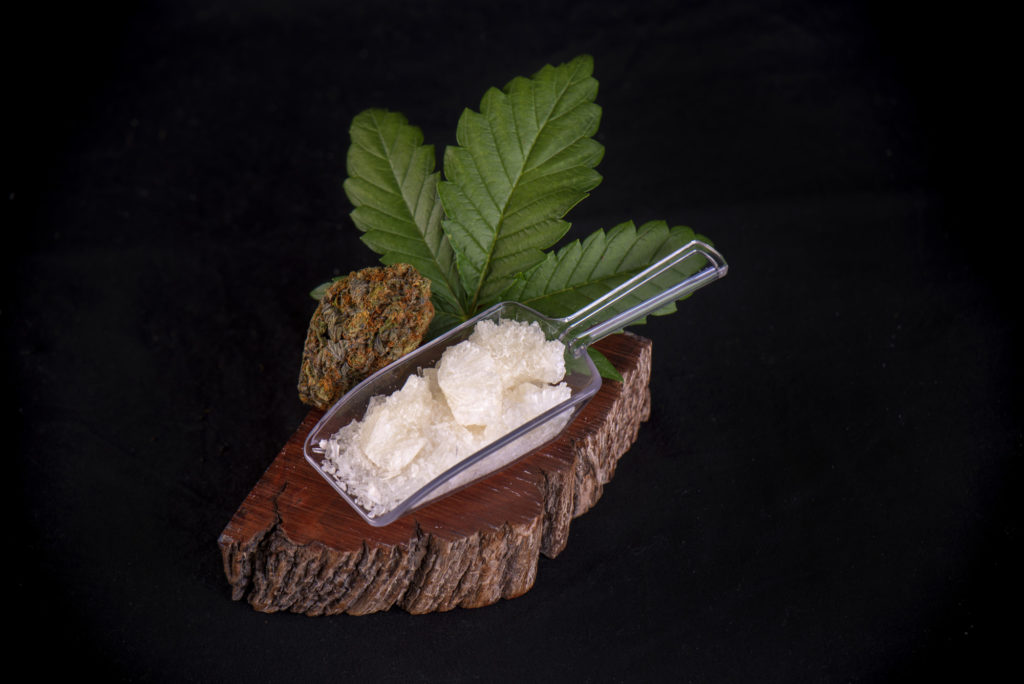
If you want to add CBD to your wellness routine, some things are worth knowing.
There are many different types of CBD, with full spectrum and CBD isolate being among the most popular.
Regarding CBD isolate vs. full spectrum, there is a lot to know. Depending on your state, the laws may be different from what type of CBD you can acquire.
However, the search for the right CBD does not have to be confusing. We are here to break down the important distinction between CBD isolate and full spectrum CBD.
Ready to learn more? Then keep on reading.
What Is CBD?
First things first, it’s imperative to understand what CBD Is.
CBD, derived from cannabis, is a plant compound that has made its way to the forefront of the wellness world.
Though CBD is a cannabis derivative, it will not present users with a high, unlike marijuana. The distinction between CBD and marijuana is the amount of THC present.
Marijuana has a high concentration of the psychoactive compound THC. Because of this, it can alter the user’s mental state and lead to a high.
CBD, on the flipside, leaves users feeling relaxed, without any psychoactive components. Additionally, CBD has shown promising results as a treatment for anxiety, chronic pain, and more. Though the research is still new, more and more individuals are trying it out.
As previously mentioned, CBD on its own doesn’t have any psychoactive components; however, there are traces of THC in some types of CBD. The THC amount, depending on where you live, can affect CBD’s legality.
Now that you know the basics regarding CBD let’s dive into the distinctions and legalities of particular CBD.
CBD Isolate vs. Full Spectrum
CBD isolate, and full spectrum CBD are the most popular forms.
However, they do have their differences. For example, CBD isolate, as the name suggests, is just pure CBD. To attain this purity, the cannabis plant is extracted from all of its other compounds, including THC and other cannabinoids.
When this extraction is complete, all that is left is pure CBD. Usually found in a powder, block, or oil form, CBD isolate can be mixed with food or ingested directly without any smell or taste.
Full spectrum CBD, on the other hand, is the complete opposite of CBD isolate. Full spectrum includes all of the cannabinoids present in the cannabis plant, including small traces of THC.
Depending on your desired results, either one can benefit your needs. Studies into full spectrum CBD oil, however, have theorized the idea that there are more benefits to be had when all of the elements of cannabis work together, also known as the “entourage effect.”
There are varying types of full spectrum CBD as well, both hemp-derived and marijuana-derived. Now that you know the distinction, we’re going to chat about the rules and regulations depending on where you live.
The Rules and Regulations
The 2018 Farm Bill altered the world of CBD.
Because of this bill, hemp is an “agricultural commodity,” and the production of hemp is legal. This includes hemp-derived CBD.
Across America, hemp-derived CBD is legal and purchasable without a prescription. However, you do have to be 18 years old or if you’re a minor, have a doctor’s permission for purchase. Additionally, hemp-derived CBD can legally have a max percentage of 0.3% THC.
This percentage distinction is standard across the country, and most online sellers and brick and mortar CBD shops sell this product over the counter. As previously mentioned, since full-spectrum CBD includes elements of THC, that 0.3% is the minimum amount present.
But, what about full spectrum CBD that has a higher amount of THC? If you are looking at CBD that has a higher percentage of THC than 0.3%, you may need a marijuana card to purchase or live in a state where recreational marijuana usage is legal.
This is because there is marijuana-derived full spectrum CBD, which can vary in its percentage of THC, usually much stronger than hemp-derived.
Since the exact amount of THC can be unspecified, on marijuana-derived full spectrum CBD, you may need a medical marijuana card to purchase or a prescription by a doctor in states where recreational marijuana is illegal.
However, CBD isolate is entirely legal and acquirable over the counter and online. Since there is no trace of THC in CBD isolate, you can obtain it without any legality issues.
Understanding the Best CBD For You
Depending on your needs, you may be wondering if CBD isolate or full spectrum CBD is best for you.
Indeed, it’s up to you to decide. Full spectrum CBD is more common for users who want more concentrated and well-rounded results; however, CBD isolate also can be useful as well.
The benefits between CBD isolate, and full spectrum are common; however, full spectrum may offer more intense relief and pain management due to the aforementioned “entourage effect,” though this can vary from person to person.
Moreover, CBD isolate may be better for users who consume CBD often and want to make sure they are in the clear for potential random drug testing. Though hemp-derived, full-spectrum CBD contains less than 0.3% of THC, if you are a frequent user, it can, in some cases, show up on a drug test even if you don’t experience a high.
CBD products come into play as well. For example, you may find that your body works best with CBD lotions or CBD oil droplets. It depends on what your specific health goals are, and then looking for the best quality CBD possible.
Going Into the World of CBD
Now that you know the distinction, legality, and basic chemistry of CBD isolate vs full spectrum, you can go into the world of CBD feeling confident in your research.
Though CBD is a budding research topic, the results are looking promising. If you want to learn more about high-quality CBD products, then check out our website for more information.





















Add Comment